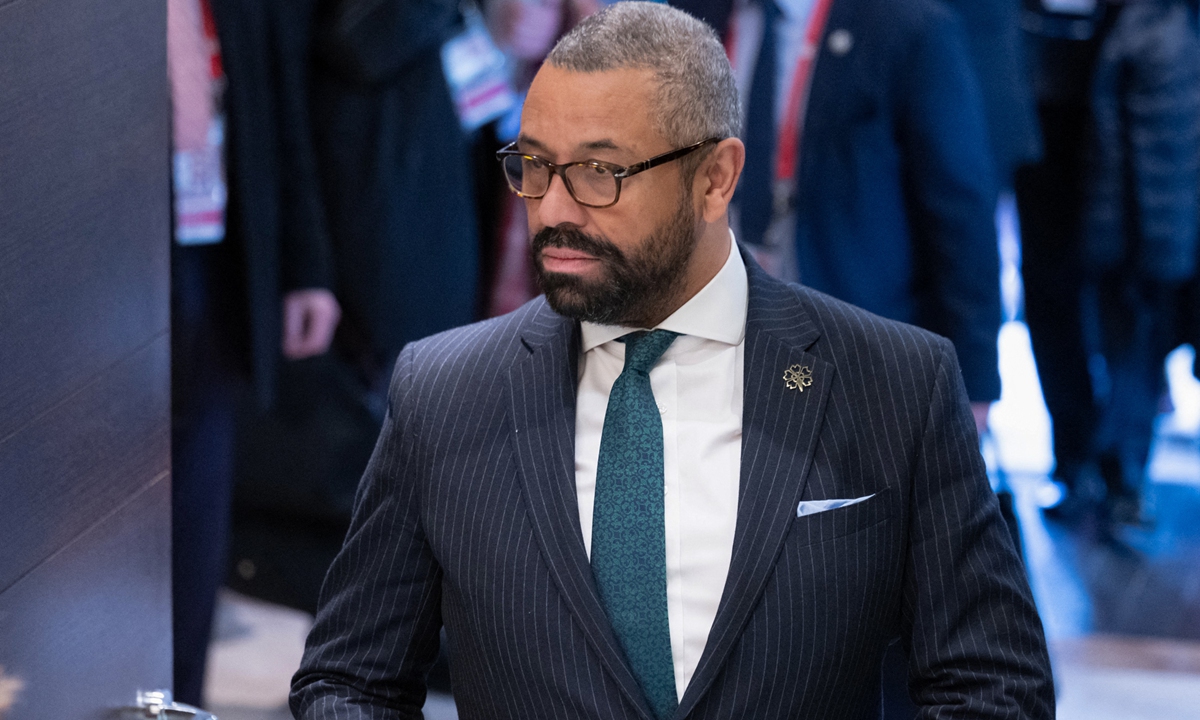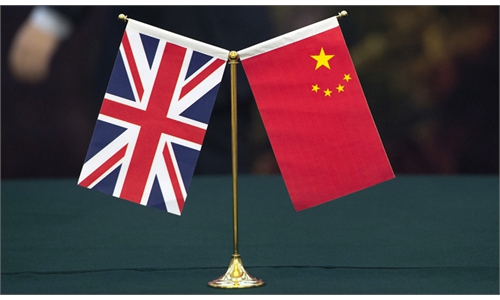
British Foreign Secretary James Cleverly Photo: AFP
British Foreign Secretary James Cleverly will visit China on Wednesday, the first British foreign secretary to visit China in five years. Cleverly is making the first tentative steps toward defrosting the chilly diplomatic atmosphere which currently exists between Beijing and London.Cleverly may posture and puff out his chest in a manner that many colonial-minded British might find nostalgic, but Britain is no longer the figure of an empire, and no longer a towering presence on the international stage. It is crippled by inflation, a cost of living crisis, crumbling infrastructure, and deep societal divisions exacerbated by, but not solely caused by, Brexit. There is also political instability (last week, a former Tory Cabinet minister criticized Rishi Sunak for leading a "zombie government" taking the British public for fools). For the first time in a decade, the prime minister of Britain, a permanent UN Security Council member, has announced he will not attend the next UN General Assembly. There is less money for public services, the military, cultural organizations and the diplomatic corps: Britain's capacity for projecting power, both soft and hard, is diminished. In this context, at present, Cleverly would seem to have little to offer.
However, that does not mean that he will not be welcome in China, or that the visit itself is without any value.
We know the points he wants to make to the leadership in Beijing, because they have been well-publicized in the Western media. He has spoken at some length publicly about what he would hope to achieve during his short journey to the East. He has talked about issues around Xinjiang, Hong Kong and the sanctioning of some British parliamentarians. But he has also spoken about the need for a constructive relationship. He has said that war with China is not inevitable.
Cleverly knows his presence in the Chinese capital will have limited effect. His ambitious talk - and his early characterization of China as a threat - has been for domestic consumption to appease elements within his own political party which are rabidly anti-China. He must be given credit for not just acknowledging their concerns - however blinkered or unjustified they are - but for standing up to them. Similarly, any British foreign minister concerned with projecting his country's interests in the East must always have one eye fixed toward the West - for America is heavily focused on undermining Chinese interests, and expects its allies to follow in its footsteps. That Cleverly, and Prime Minister Sunak, have chosen a path which veers from this trail by attempting to engage with China more than Washington would like, shows commendable independence of thought.
It cannot be denied that the British government's recent attitude toward China has been inconsistent to say the least - dictated in part by the disruptive, destabilizing parade of five prime ministers in just six years. In 2016, then prime minister David Cameron spoke of a "golden age" of prosperity between the two countries. His successor Theresa May was decidedly cooler toward Beijing. When Boris Johnson took over, a rapprochement seemed to be underway, at least until Washington forced him to take a hardline approach toward Huawei or face the consequences of US sanctions. Liz "blink-and-you'll-miss-her" Truss's preposterous 49-day premiership was characterized by extreme hawkishness toward China, until she was replaced by Sunak. During his campaign to be elected leader, Sunak spoke harshly about China in a bid to attract the support of the extreme right of his party, but since then he seems to have softened his attitude. In contrast to the confrontational approach of Truss, he seems eager to pursue a more positive policy of engagement: It appears that there is finally a shift back towards Beijing, but this time in a more constructive manner. Leaving aside the unrealistic imperial posturing, Cleverly seems to be engaging in realpolitik.
In one sense, it will not matter that the upcoming visit is unlikely to achieve any significant diplomatic breakthrough or foreign policy goal for either side.
The current British government has another 16 months in power at the most. UK electoral law dictates that the next general election must take place by January 2025 and if the current polls are to be believed, then the Conservative Party does not have a snowball's chance in hell of winning a new term in office. Therefore almost certainly a new Labour administration will be in power and will have five years to develop its own foreign policy agenda toward China.
Cleverly's visit could be the first step which transcends British party politics. It could lay the ground for a warmer relationship, but any steps which Cleverly takes in Beijing will be the start of a journey which someone else will complete. The UK tends to have short-term ambitions but China takes the long view in international relations. In that sense, any thawing of any Cold War mentality is something worth having.
The author is a journalist and lecturer living in Britain. opinion@globaltimes.com.cn

